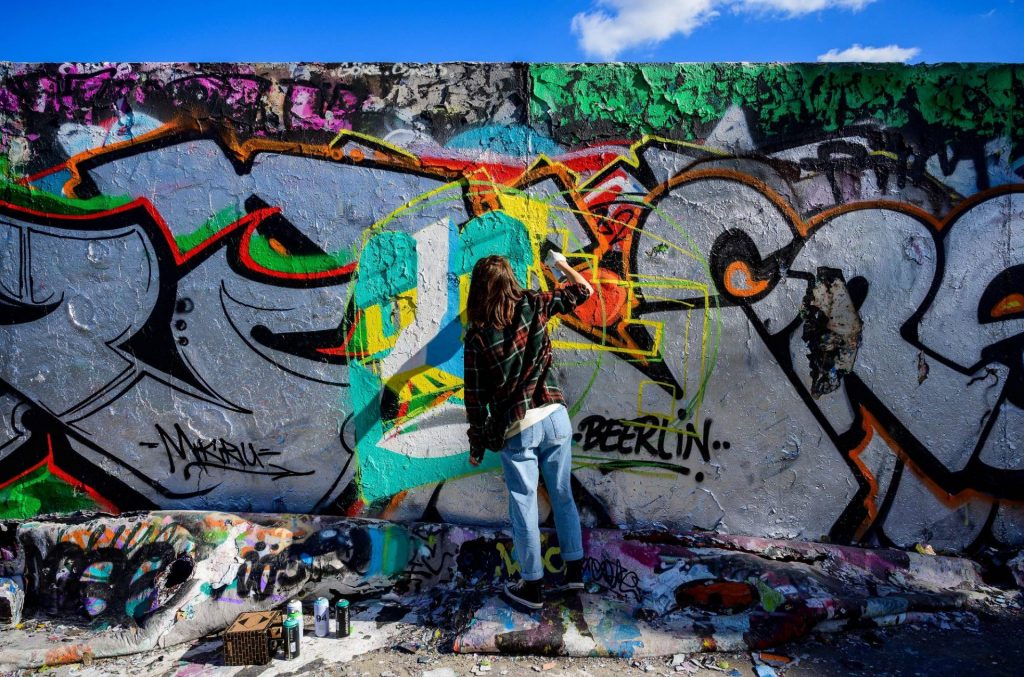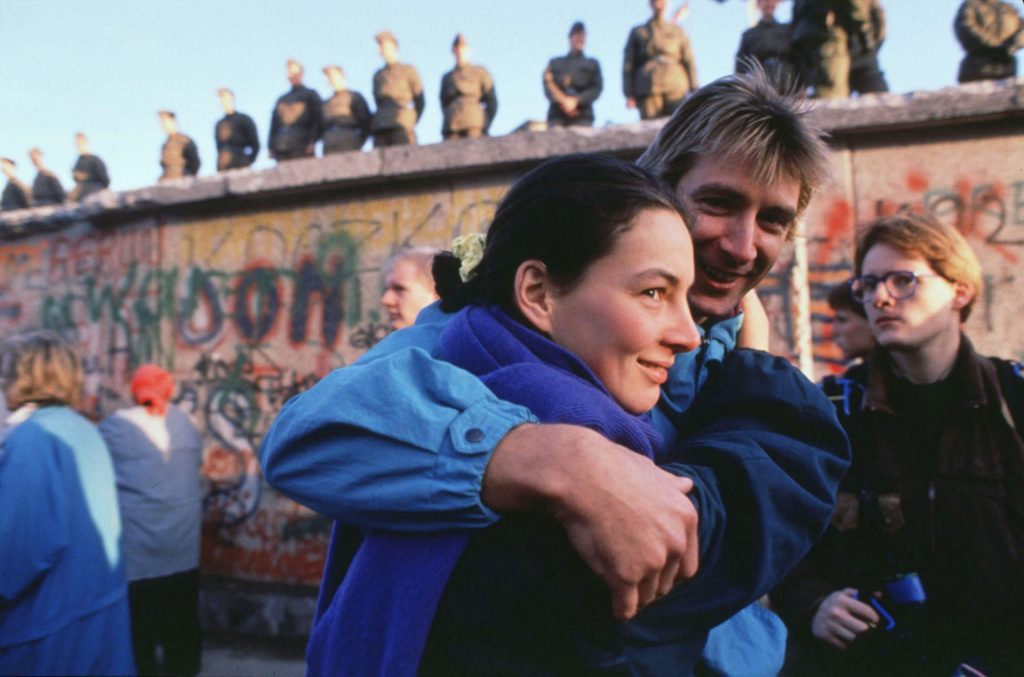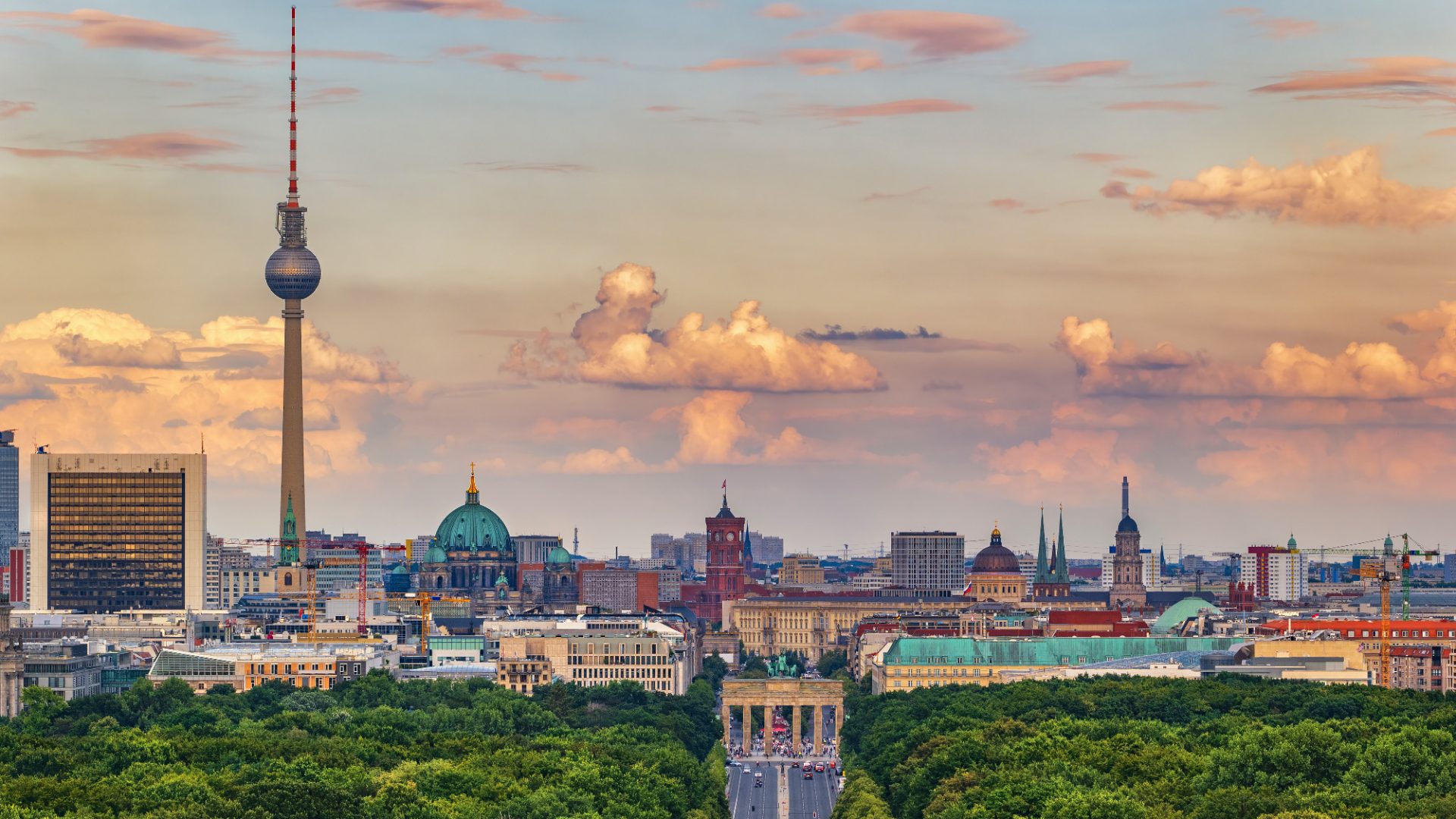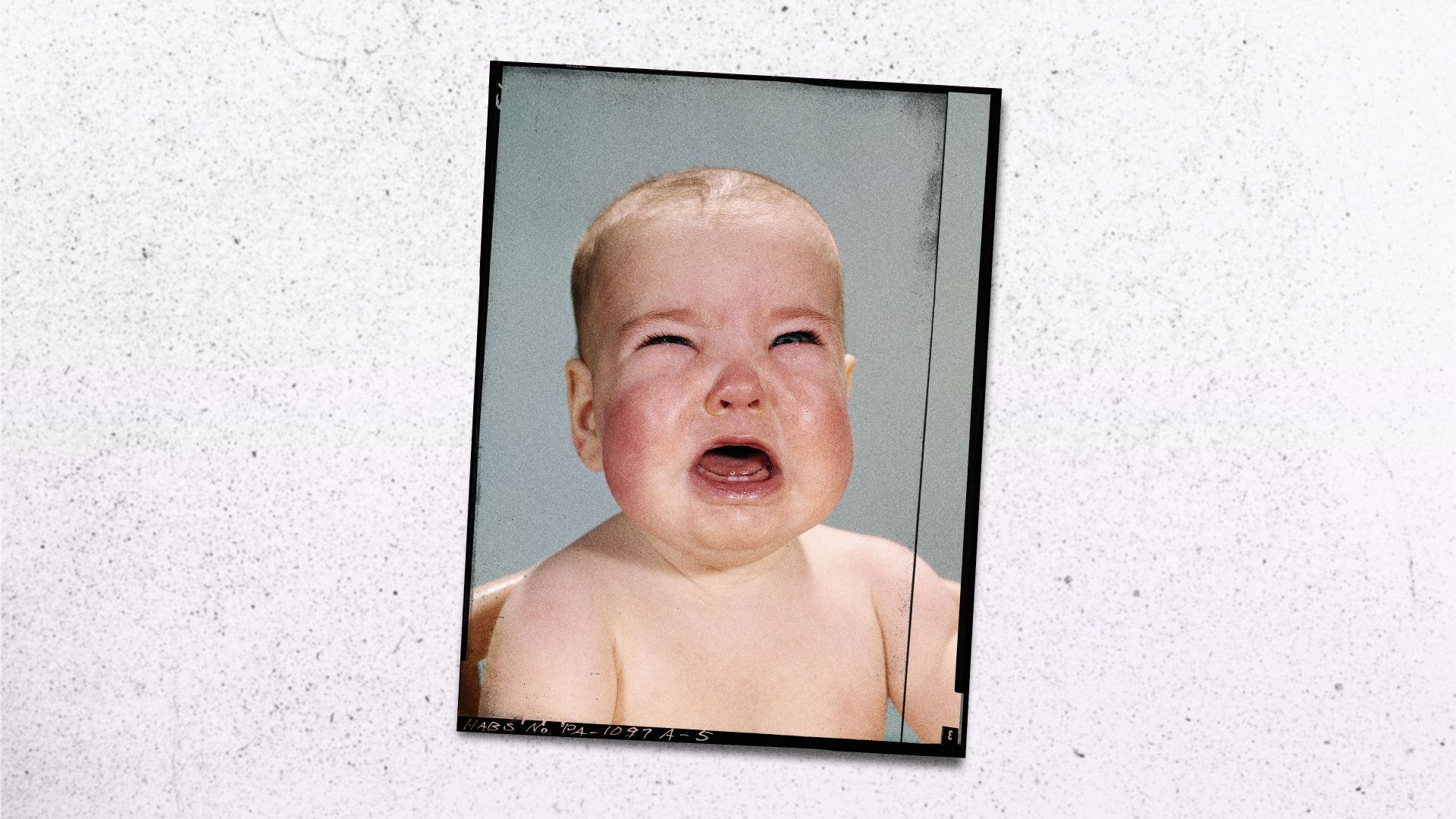In Berlin, the weight of history is everywhere. Thirty-five years after the fall of the Wall wrote a new chapter in the story of Germany’s capital, the New European team travelled there to compile the first in an irregular series of reports on the spirit of Europe’s greatest cities.
My father, Fred, who had fled Bratislava in 1939 shortly after Hitler invaded Czechoslovakia, was returning to Germany for the first time since his perilous escape. This was early summer 1988 and it didn’t start well. Lufthansa lost his bags at Cologne-Bonn airport. So much for German efficiency. Luggage eventually retrieved, he and my mum stayed with me in my quiet flat on a quiet street in the quiet capital on the Rhine.
He wanted to visit Berlin, and so we set off in my car across the country and along one of the transit routes that led westerners across East German territory to the divided city. The day after our arrival, we headed into East Berlin via the famous American checkpoint that only citizens of allied countries were allowed to use.
Nervously he engaged the East German border guard perusing his British passport in conversation. My father was speaking in German, but the soldier couldn’t understand him and turned to me to translate. His was a Central European vernacular that had been stuck in aspic for half a century.
Eighteen months after that visit, the Berlin Wall came down; Germany changed for ever, and for the better. Eighteen years after that visit, Britain put up a wall of its own. It changed for ever, and for the worse.
The night after the Brexit referendum, on Friday June 24, 2016 to be precise, I was at my in-laws’ home in Islington. The mood was funereal. My father-in-law then turned to me and, apropos of nothing, said in German: “We are all Europeans now.” To which my response was: WTF. Not to the sentiment, but to the language.
Eric, like my own dad, was Jewish. Both men had married Anglo-Saxon Protestant women. Neither ever spoke German to me or to anyone. Both had relegated their Germanic roots into the background to assimilate. A pillar of the British establishment (he had been rector of Imperial College and knighted for his services to science), Eric immediately decided that he had to get German citizenship for his side, my wife’s side, of the family.
And so he did.
That was the start of my new journey, my new sense of identity. It had been a long time in coming.
Immediately after my stint in Bonn as a trainee reporter for Reuters news agency, I was sent to East Berlin to become the Telegraph’s first (and, it quickly turned out, last) correspondent to the German Democratic Republic. There I had a front-row seat at all the dramatic events.
It was a lesser-known moment in October 1989, a month before the fall of the Wall, however, that has stayed with me most. By that autumn, demonstrations against the regime were a regular occurrence; the defiance and optimism were infectious, though nobody knew where it would lead.
I was told of a vigil being planned in the Gethsemane Church in Prenzlauer Berg. In those days the district was close to the wall, dominated by rundown 19th-century tenements, several of which were being squatted. Nowadays it is hipster Notting Hill, Americans in polo necks pretending to be locals and out-of-town Germans pretending to be cool, one of several parts of Berlin where irritatingly you struggle to speak German.
Hundreds spent the weekend inside the church, me among them. People linked arms, sang hymns and said prayers. By Sunday afternoon, the authorities warned they would clear the area. By the evening, we could see the searchlights through the stained-glass windows and hear the yelping of police dogs. “My God, the Chinese solution is finally here,” cried a woman near me.
Only a few weeks earlier, a high-level delegation of the ruling Communist Party, the SED, had visited Beijing. Erich Honecker’s heir-apparent, Egon Krenz, had thanked the Chinese government for cracking down on the student movement at Tiananmen Square that June. Krenz’s speech was widely disseminated by the state media as a warning to protesters back home. The service ended; the priest invited us to leave in silence.
We had no idea what would happen next. I counted about 50 army trucks. A loudhailer told us to put our hands on our heads. Hundreds were taken away, chanting “no violence” as they were grabbed by the head or hit with truncheons while being bundled into vans. Yet crucially, nobody was killed.
That was the turning point and, for me, that evening defines modern Germany and is testament to it. An entire system collapsed peacefully. And in the most militarised city in the world.


Whatever some lazy historians might say, there was nothing inevitable about the fall of the Wall or the collapse of communism. Nobody, not even on the fateful morning of November 9, 1989, could have predicted what was about to happen that evening or that, 11 months later, Germany would reunify as smoothly as it did. Yes, mistakes were made. Too many Eastern enterprises were shut down in the height of the free-market globalisation obsession. Too many “Wessis” behaved arrogantly towards “Ossies”.
But I struggle to think of any other country – imagine the UK in all its chaotic clownishness in dealing with its self-inflicted trauma – that could have done what the Germans did.
Which fast-forwards me to 2016. I realised I had to get off the island, as the Germans call the UK (or “the party island”, the name they gave it during the Boris Johnson/Covid era). I’m not the only one. There are said to be 40,000 “Brefugees” who have come to start a new life in Berlin over the past eight years. Many are in the tech sector or in culture.
So, what is it about the place? Unlike in London (though I generalise), they don’t do small talk in Berlin. They don’t talk about house prices (almost everyone rents). I remember one time walking with a friend past a tastefully renovated apartment block and wondering out loud how much a flat there would cost. To which he retorted: “John, don’t be so vulgar.”
Conversations about the city inevitably draw on the terrible past. They are just as likely now to dwell on the difficult present – Germany’s fraught relationship with Russia and the even more heated discussions about Israel. (I have lost a few friends recently for suggesting to them that their knee-jerk pro-Netanyahu sentiments are more about their own inability to come to terms with their guilt than an objective assessment of Middle East politics).
I would rather have bust-ups such as these, though, than trivia. History and politics seem to pervade everything in Berlin. During the lockdown I decided to walk the streets, to investigate each district as I embarked on writing a personal, quirky 800-year story of the city, called In Search of Berlin.
As I wrote in the introduction to that book: “Berlin has stumbled from enlightenment to militarism, from imperialism to democracy to dictatorship, from village to world city to surrounded island. It has been a trading post, military barracks, a centre of science and learning, industrial powerhouse, hotbed of self-indulgence and sex – and control centre for the worst experiment in horror known to man. It was at the heart of the cold war, the frontline of communism and hangout for hippies and draft-dodgers. It has been the site of three failed revolutions – and that one extraordinarily successful popular uprising.
“Berlin has always fretted about its status. No other city has had so many faces, so many disasters and has reinvented itself so many times. No other city is so confused about itself and what it imagines itself to be in the future. Berlin is tortured by its history and yet many buildings look as if they have no history. Each site, almost each paving stone, has lived many lives, each era superimposing itself on the one before. Each plague, each fire, each war, each act of destruction and self-destruction, requires it to start again.
“Berlin is a laboratory. Everyone here seems to have come from somewhere, to have a story to tell. It’s a place where traumas are unleashed. It is also where the traumatised gather. For much of its existence, Berlin has been dismissed as ugly, uncultured and extreme. It is a hotchpotch of architecture and a city planning nightmare. It is one of Europe’s most sparsely inhabited capitals and yet it suffers one of its most acute housing shortages, a problem it has struggled with for centuries. For decades its standard of living has been below the national average. The city has few natural resources, no manufacturing to speak of and not much wealth.”
Therefore, what is it about the place? The British architect David Chipperfield (another who finds himself more at home in Berlin than London) once said to me: “Berlin is a place you project yourself on to. It’s not a completed masterpiece, but a canvas on which different generations have painted.”
When he was made an honorary citizen of Berlin three years ago, the German president, Frank-Walter Steinmeier, said that like so many others down the ages, when he first came to Berlin he couldn’t understand what made it tick. He ventured to suggest that he now did: “Berlin has throughout its history been a place of longing for those who have found it too cramped elsewhere. The alien, the different, the new are not rejected or excluded; they are curiously and hungrily embraced and absorbed; this openness characterises Berlin like almost no other city I know.”
Over the past year or so, I have been constantly ribbed about my love affair with this country because of my previous book, Why the Germans Do it Better. Someone in the Telegraph (my erstwhile paper) can be counted upon once a week to write: “that didn’t land so well, did it?” Snort, snort.
Then there are the self-hating Germans – always guaranteed a good slot in the British media – who take a similar view, who can see nothing to be proud of. But then again, I ask myself, when in the past 40 years of knowing this country has any German ever said: “No complaints. Things are going pretty well, thanks very much.”
Schadenfreude may be a German word, but it is a British obsession. It provides balm for people having to watch their country drifting off into the mid-Atlantic as their water companies pour excrement into their rivers, as their towns riot and their hospitals park you for hours in corridors.
At least the UK has a serious government for the first time in a long time, embarking – with so far very modest success – on the long haul of getting the country back on its feet.
For sure, Germany is in a mess. Its three-party coalition government is on its last legs. Its trains are at least as bad as ours. The economy is in recession for a second year. Its car industry is ailing under the weight of China. Its role in the world is uncertain.
As for Berlin, it has none of the classic aesthetics of Paris, Vienna or Rome. It can still feel provincial (which you can see either as good or bad). Where else would you find an allotment garden close to the chancellor’s office? Service is often abrupt. Cash is still king. The internet is slower than Albania’s.
Berlin doesn’t come together, but it somehow hangs together. Its shortfalls are tangible. It is unloved by those who fail to understand it. Its draw is more ephemeral and harder to identify. But when you “get” Berlin, it seeps into your skin.
It’s certainly done that with me.
John Kampfner is the bestselling author of In Search of Berlin and Why the Germans Do it Better




